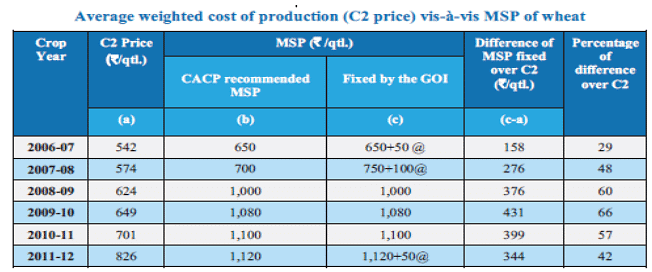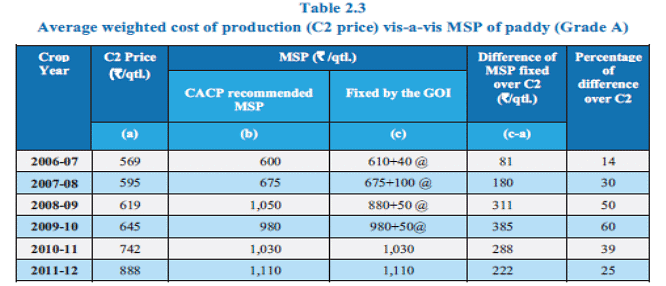Agricultural Price Policy - 3 | Agriculture Optional for UPSC PDF Download
Agriculture Marketing
While production programs are crucial for increasing productivity and overall production in the country, having efficient agricultural markets is equally important. This is vital to keep farmers motivated to produce. An efficiently functioning market allows producers to receive better prices for their goods while also making products available to consumers at more affordable prices. This can be achieved by ensuring that agricultural markets are well-connected and unified at the national level, with reasonably open exports and imports, healthy competition among buyers and sellers, transparent price discovery mechanisms, modern infrastructure, and minimizing intermediaries between producers and consumers.
Organized marketing of agricultural commodities has been encouraged in the country through a network of regulated markets to ensure fair benefits for farmers and consumers by creating a favorable market environment that balances supply and demand forces. There is significant variation in the density of regulated markets across different parts of the country, ranging from 103 square kilometers in Punjab to 11215 square kilometers in Meghalaya. The low density of market coverage in states poses challenges in terms of market access for small and marginal farmers. Additionally, these state-controlled/regulated markets often lack the necessary facilities and amenities due to resource limitations.
To bring about reforms in the agricultural marketing sector, the Agriculture Produce Marketing Committee (APMC) Act of 2003 was developed and shared with all states and union territories. To date, 16 state governments have amended their respective APMC Acts.
In order to ensure that farmers receive a larger share of consumer prices, there is a need to reduce the multiple layers of intermediation by establishing alternative marketing channels. Several states have taken steps in this direction by creating farmers' markets, such as 'Apni Mandi' in Punjab, 'Kisan Mandi' in Rajasthan, 'Hadaspur Vegetable Market' in Pune, 'Rythu Bazaars' in Andhra Pradesh, 'Uzhawar Santhai' in Tamil Nadu, and 'Krushak Bazaars' in Orissa. These markets benefit both farmers and consumers.
Findings by the Comptroller and Auditor General (CAG)
The Comptroller and Auditor General (CAG) noted that when determining the cost of production for each crop, the Commission for Agricultural Costs and Prices (CACP) adhered to a specific procedure. However, there was no established standard for determining and setting the Minimum Support Price (MSP) over the cost of production, resulting in significant year-to-year variations. The difference between the all-India weighted average cost of production and the MSP set by the Government of India from 2006-07 to 2011-12 is as follows.

The margin of the Minimum Support Price (MSP) over the cost of production exhibited significant fluctuations, ranging from 29 percent to 66 percent for wheat and 14 percent to 60 percent for paddy during the period from 2006-07 to 2011-12.
Cultivation costs vary significantly from one region to another, with higher expenses typically incurred in states like Punjab, Haryana, and Andhra Pradesh due to elevated labor wages, land values, and input usage. Therefore, applying a uniform MSP across the entire country tends to leave farmers in surplus-generating intensive farming regions dissatisfied. As a result, it is suggested that the market should have a more significant role in determining prices.
A committee chaired by Ramesh Chand, Director of the National Centre for Agricultural Economics and Policy Research, has been established to investigate the cost concepts involved in setting the Minimum Support Price (MSP) and assess whether there is a need to reposition the Commission for Agricultural Costs and Prices (CACP) in light of agricultural liberalization in India. The new committee will assess whether the methods used to calculate key factors essential for determining MSP, such as the value of family labor, land rental value, interest on capital, and depreciation of fixed assets, are appropriate. The committee will include representatives from state governments, farmer organizations, and the Department of Economic Affairs.
Conclusion
The government's agricultural price policy aims to ensure that farmers receive fair prices for their produce, encouraging increased investment and production while also protecting consumers' interests by making goods available at reasonable prices. This policy intends to establish a balanced and integrated price structure that aligns with the country's overall economic needs. To achieve these goals, the government annually announces Minimum Support Prices (MSPs) for key agricultural commodities and conducts procurement operations through various agencies to prevent prices from falling below the MSP. These MSPs are determined by considering recommendations from the Commission for Agricultural Costs and Prices (CACP), input from state governments, central ministries, and other relevant factors.
The uniformity of MSP across the nation has led to the use of an all-India weighted average cost in the formulation of price policies. However, this process is not entirely mechanical, and the weight assigned to each factor in determining price policies is a result of informed judgment. As a result, there is a need for increased transparency in the methodology used to calculate MSP over the cost of production.
|
52 videos|224 docs
|





















